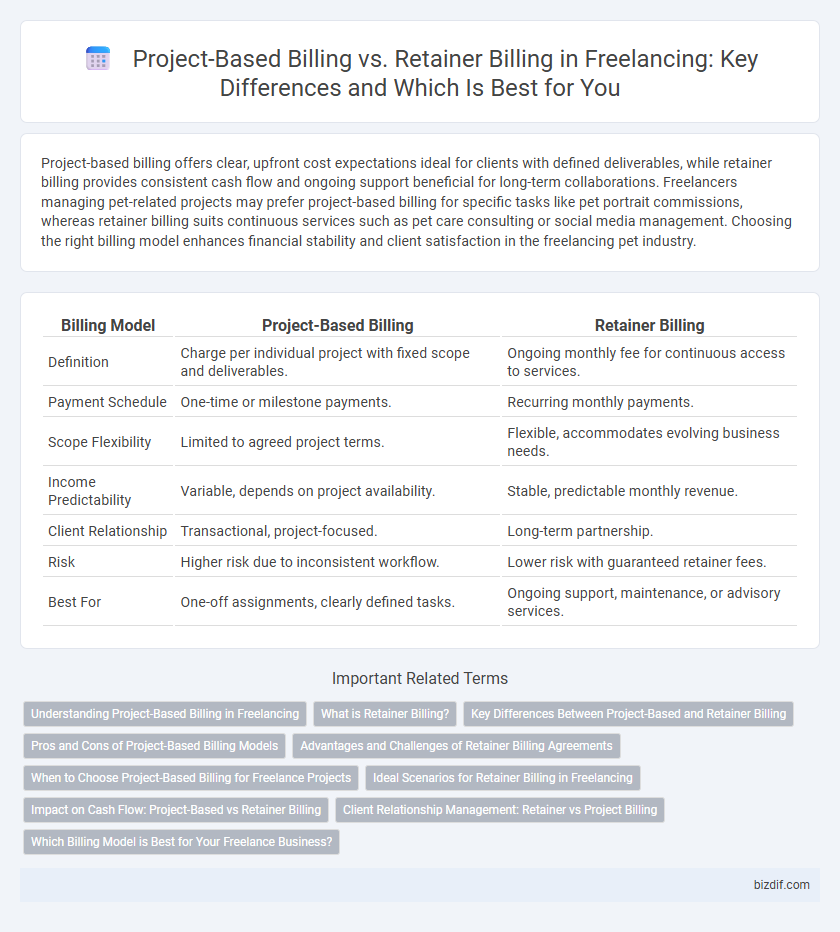Project-based billing offers clear, upfront cost expectations ideal for clients with defined deliverables, while retainer billing provides consistent cash flow and ongoing support beneficial for long-term collaborations. Freelancers managing pet-related projects may prefer project-based billing for specific tasks like pet portrait commissions, whereas retainer billing suits continuous services such as pet care consulting or social media management. Choosing the right billing model enhances financial stability and client satisfaction in the freelancing pet industry.
Table of Comparison
| Billing Model | Project-Based Billing | Retainer Billing |
|---|---|---|
| Definition | Charge per individual project with fixed scope and deliverables. | Ongoing monthly fee for continuous access to services. |
| Payment Schedule | One-time or milestone payments. | Recurring monthly payments. |
| Scope Flexibility | Limited to agreed project terms. | Flexible, accommodates evolving business needs. |
| Income Predictability | Variable, depends on project availability. | Stable, predictable monthly revenue. |
| Client Relationship | Transactional, project-focused. | Long-term partnership. |
| Risk | Higher risk due to inconsistent workflow. | Lower risk with guaranteed retainer fees. |
| Best For | One-off assignments, clearly defined tasks. | Ongoing support, maintenance, or advisory services. |
Understanding Project-Based Billing in Freelancing
Project-based billing in freelancing involves charging clients a fixed fee for the completion of a specific project, allowing clear budgeting and defined deliverables. This billing method suits freelancers handling tasks with well-defined scopes or deadlines, such as website development or graphic design. Accurate project estimates and clear contracts are essential to avoid scope creep and ensure profitability in project-based billing.
What is Retainer Billing?
Retainer billing in freelancing involves clients paying a fixed amount regularly to secure ongoing access to a freelancer's services, ensuring priority availability and continuous support. This billing model fosters long-term client relationships and provides freelancers with predictable income streams, enhancing financial stability. Retainer agreements typically outline scope, hours, and deliverables, allowing flexibility while maintaining consistent workflow management.
Key Differences Between Project-Based and Retainer Billing
Project-based billing charges clients a fixed fee for a defined scope of work, ensuring clear deliverables and deadlines, ideal for one-time tasks or specific projects. Retainer billing offers ongoing services for a recurring fee, providing consistent income and long-term client relationships, often used for continuous support or maintenance. The key differences lie in payment structure, predictability of income, and flexibility in workload management.
Pros and Cons of Project-Based Billing Models
Project-Based Billing offers clear scope and fixed pricing, providing clients with predictable costs and freelancers with defined deliverables, which simplifies budget management. However, it can lead to income variability and scope creep risks, as unanticipated revisions or expanded tasks may require additional negotiation or uncompensated work. Freelancers must carefully outline project terms and maintain strict boundaries to prevent overextension and ensure profitability within this billing model.
Advantages and Challenges of Retainer Billing Agreements
Retainer billing agreements offer freelancers consistent monthly income and stronger client relationships by securing ongoing work commitments. This model enhances cash flow predictability and allows for better resource allocation, but it may restrict flexibility due to fixed service scope and potential scope creep challenges. Effective communication and clear contract terms are essential to mitigate misunderstandings and ensure mutual satisfaction in retainer agreements.
When to Choose Project-Based Billing for Freelance Projects
Project-based billing is ideal for freelance projects with clearly defined deliverables and timelines, allowing clients to pay a fixed price for specific work outcomes. It provides budget predictability and reduces scope creep in short-term or one-time assignments like website design or content creation. Freelancers benefit from streamlined invoicing and focused project management when choosing project-based billing for discrete, goal-oriented tasks.
Ideal Scenarios for Retainer Billing in Freelancing
Retainer billing in freelancing is ideal for long-term projects requiring continuous support, such as ongoing website maintenance, marketing campaigns, or consulting services. Clients benefit from predictable monthly costs and prioritized access to the freelancer's expertise, ensuring seamless project progression. This billing model supports steady cash flow for freelancers while fostering lasting client relationships through sustained collaboration.
Impact on Cash Flow: Project-Based vs Retainer Billing
Project-based billing often leads to irregular cash flow as payments are received upon milestone completion or project delivery, creating potential gaps between income periods. Retainer billing ensures a steady, predictable cash inflow by securing ongoing monthly payments, reducing financial uncertainty and improving budgeting accuracy. Freelancers using retainers can better manage expenses and invest in growth opportunities due to consistent revenue streams.
Client Relationship Management: Retainer vs Project Billing
Retainer billing fosters ongoing client relationship management through continuous support and collaboration, which builds trust and ensures consistent cash flow. Project-based billing limits interactions to the project's duration, potentially hindering long-term engagement and reducing opportunities for upselling or proactive problem-solving. Establishing retainer agreements typically results in deeper client insights and stronger partnerships, enhancing retention and client satisfaction over time.
Which Billing Model is Best for Your Freelance Business?
Project-based billing offers clear deliverables and fixed costs, ideal for freelancers handling well-defined tasks like website design or content creation. Retainer billing provides steady income and long-term client relationships, making it suitable for ongoing services such as marketing strategy or IT support. Choosing the best billing model depends on your service type, client needs, and preferred cash flow reliability in your freelance business.
Project-Based Billing vs Retainer Billing Infographic

 bizdif.com
bizdif.com